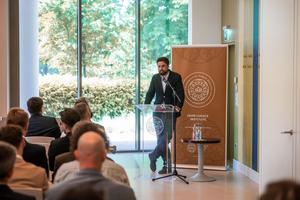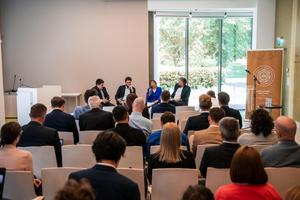With the participation of distinguished experts, the John Lukacs Institute for Strategy and Politics (JLI) at the Ludovika University of Public Service organized a conference entitled ‘Does Europe Have a China Card? – The EU’s Strategic Room for Maneuver After the U.S. Presidential Election’ on May 29 at the university’s Orczy Road Residence Hall.
In his opening remarks, Bernát Török, Director General of the Eötvös József Research Center, emphasized the importance of understanding the changing world order and the role of Europe and Hungary within it. He recalled that when the John Lukacs Institute for Strategy and Politics was established a year and a half ago, the geopolitical shifts that continue to define the international environment were already apparent. This recognition led to the decision to interpret these dynamics within the framework of a dedicated research institute. Török also addressed the implications of whether Europe truly possesses a “China card” in the geopolitical arena. “I believe that the card analogy illustrates the transformations around us more vividly than usual. At the same time, it is crucial to note that one cannot play cards without knowing the rules—cards are meaningless without an understanding of the game,” he remarked.
During the event, invited experts delivered presentations on the EU’s strategic autonomy and its relations with both the United States and China. Margot Schüller, Senior Researcher at the German Institute for Global and Area Studies (GIGA), outlined the challenges facing Europe, referencing the report on EU competitiveness presented by former Italian Prime Minister and former President of the European Central Bank Mario Draghi. Schüller underlined the urgent need to implement a new industrial strategy. She contrasted this with China’s rise over the past decade, noting its growing competitiveness in science, technology, and innovation—posing a challenge not only to European countries but also to the United States. “Europe has become less important for China, and we must consider how we might regain relevance,” Schüller stressed. She also noted that China’s Made in China 2025 initiative, which aims to surpass leading countries in key technologies, has altered global political positions. For instance, the United States views the program as a threat to its technological leadership and military dominance.
Maciej Kalwasiński, Analyst at the OSW Centre for Eastern Studies, stated that American policy has long regarded China’s rise as a threat. He noted the uncertainties surrounding former President Donald Trump’s stance on the issue, pointing to internal contradictions within the administration, as well as broader unpredictability and inconsistency. Kalwasiński also highlighted structural imbalances in the Chinese economy—specifically the disproportionate share of global manufacturing (over 30%) relative to domestic consumption (less than 15%). He observed that Chinese exports to the EU are not growing as rapidly as they could.
Viktor Eszterhai, Research Fellow at JLI and Head of the Institute’s China and Indo-Pacific Research Program, discussed the emergence of a new strategic environment that demands new tools and solutions. He noted that the United States no longer possesses the same capacities as it once did, and pointed to Washington’s increasing expectations that allies should contribute more to security and market access. According to Eszterhai, these developments are eroding the international order, with the U.S. seeking to rewrite the rules of the game unilaterally, without consulting the EU. He emphasized the importance of recognizing that the United States is acting in accordance with its own interests—but Europe must also strive to defend its own.
The conference concluded with a roundtable discussion moderated by Zoltán Vörös, Senior Research Fellow at JLI. Panelists examined what the concept of the “China card” might mean from a European perspective. They discussed Europe’s potential leverage and expressed concern about the EU’s fragmented nature and the absence of a unified approach. The participants highlighted how member states’ economic ties with China lead to divergent interests regarding regulation and risk mitigation. They underscored the need for greater internal cohesion within the EU, suggesting steps such as loosening fiscal rules and proposing joint debt issuance to build the Union’s internal capabilities.
Text: Éva Harangozó
English translation: John Lukacs Institute for Strategy and Politics
Photo: Dénes Szilágyi
.jpg)





